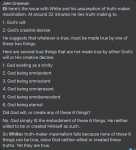I recently saw a comment on Facebook by someone named John Cranman. I will be honest: the name did not ring any bells with me until I did a search and discovered that the gentleman I discussed Romans 9 with on Unbelievable in London was named John Cranman. Assuming we are dealing with the same individual, this sort of makes more sense now. In any case, I would like to invite you to read and ponder this comment. In fact, don’t read my response until you have spent a few moments thinking through Cranman’s argument:

Now, what should immediately grab one’s attention is that Cranman is paralleling the theoretical body of “true subjunctive conditionals” that allegedly tell God what any possible person He could ever create would do in any conceivable circumstance with the very attributes of God. Consider that for just a moment. God’s eternity, for example, is listed by Cranman. This is paralleled with theoretical subjunctive conditionals about as-yet undecreed and uncreated human choices in as yet undecreed and uncreated circumstances in all feasible theoretical worlds. The same with God’s omnipotence, omniscience, omnipresence—goodness, even the reality of God’s triune nature! All are paralleled with this hypothetical body of uncreated, ungrounded, evidently eternal truths about human beings that have not been decreed, defined, or created.
It is painfully obvious Mr. Cranman has missed a rather major reality: unless he is making these subjunctive conditionals eternal and divine, a very attribute of God Himself, he has committed one of the most epic theological category confusions of all time. He is connecting something outside of God that is in no way an attribute of God, let alone something that is eternally true of God’s being and nature, with the very attributes God has revealed to His creatures so that we may worship Him and know Him. He is literally saying, “Well, God did not will to create God, did He?” Or “God did not will Himself to be Triune, did He?” as if this is a serious argument in defense of Molinism’s inability to explain where the essence of middle knowledge comes from.
It truly seems to me that this kind of amazingly obvious error of thought and consideration on Cranman’s part might be a good warning for us: Molinism may be fun to play with at the Thursday night philosophy club meeting, but it has really, really damaging effects when someone tries to join it to divine revelation.


